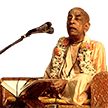Transcendental Subject Matter - an essential subject: Difference between revisions
(Created page with "Category:Essential Subjects <!----------------------- edit below this line -----------------------> <!------------------------ begin introduction text below --------------...") |
(Vanibot #0041: Moves Choose Another box to the end) |
||
| Line 2: | Line 2: | ||
<!----------------------- edit below this line -----------------------> | <!----------------------- edit below this line -----------------------> | ||
<!------------------------ begin introduction text below ------------------------> | <!------------------------ begin introduction text below ------------------------> | ||
There is a great difference between mundane stories, fiction, or history and the transcendental pastimes of the Lord. The histories of the whole universe contain references to the pastimes of the incarnations of the Lord. The Rāmāyaṇa, the Mahābhārata, and the Purāṇas are histories of bygone ages recorded in connection with the pastimes of the incarnations of the Lord and therefore remain fresh even after repeated readings. For example, anyone may read Bhagavad-gītā or the Śrīmad-Bhāgavatam repeatedly throughout his whole life and yet find in them new light of information. Mundane news is static whereas transcendental news is dynamic, inasmuch as the spirit is dynamic and matter is static. Those who have developed a taste for understanding the transcendental subject matter are never tired of hearing such narrations. One is quickly satiated by mundane activities, but no one is satiated by transcendental or devotional activities. Uttama-śloka indicates that literature which is not meant for nescience. Mundane literature is in the mode of darkness or ignorance, whereas transcendental literature is quite different. Transcendental literature is above the mode of darkness, and its light becomes more luminous with progressive reading and realization of the transcendental subject matter. | |||
Srila Prabhupada's books, lectures, conversations and letters offer a comprehensive presentation of this essential subject as seen in the Vaniquotes '''[[Vaniquotes:Category: | Srila Prabhupada's books, lectures, conversations and letters offer a comprehensive presentation of this essential subject as seen in the Vaniquotes '''[[Vaniquotes:Category:Transcendental Subject Matter|Transcendental Subject Matter]]''' category. An introduction from his books is given below in the following 8 quotes. | ||
<!-------- end introduction text and don't touch next three lines ---------> | <!-------- end introduction text and don't touch next three lines ---------> | ||
---- | ---- | ||
== Quotes from Srila Prabhupada's books == | == Quotes from Srila Prabhupada's books == | ||
<!----------------- edit quote boxes below this line -----------------> | <!----------------- edit quote boxes below this line -----------------> | ||
{{VaniQuotebox| | {{VaniQuotebox|An authoritative source is the only means of knowing about transcendental subject matter definitely. There is no alternative|Lord Kṛṣṇa, is the cause of Mahā-viṣṇu also. The ladies talking about this Vedic truth must have heard it from authoritative sources. An authoritative source is the only means of knowing about transcendental subject matter definitely. There is no alternative. '''(Śrīmad-Bhāgavatam 1.10.21)'''}} | ||
{{VaniQuotebox| | {{VaniQuotebox|As far as transcendental subject matter is concerned, it is called nitya-nava-navayamana. This means that one can go on chanting and hearing about the Lord and never feel tired but remain fresh and eager to hear more and more|Material subject matter becomes stale, and one cannot hear a certain subject for a long time; he wants change. But as far as transcendental subject matter is concerned, it is called nitya-nava-navāyamāna. This means that one can go on chanting and hearing about the Lord and never feel tired but remain fresh and eager to hear more and more. '''(Krsna Book, Chapter 13)'''}} | ||
{{VaniQuotebox| | {{VaniQuotebox|By associating with holy persons and discussing transcendental subject matters with them, one becomes convinced of the value of spiritual life. Very soon, hearing of Krsna becomes pleasing to the ear and begins to satisfy one's heart|A moment of association with holy men is the most valuable thing in life, for that moment opens the path of advancement in spiritual life." This is also confirmed elsewhere in Śrīmad-Bhāgavatam (3.25.25). By associating with holy persons and discussing transcendental subject matters with them, one becomes convinced of the value of spiritual life. Very soon, hearing of Kṛṣṇa becomes pleasing to the ear and begins to satisfy one's heart. '''(Teachings of Lord Caitanya, Chapter 12)'''}} | ||
{{VaniQuotebox| | {{VaniQuotebox|For one who is rapt in hearing and chanting about Krsna, the subject matter never becomes hackneyed or old. That is the significance of transcendental subject matter in contrast to material subject matter|It is said that it is the nature of a devotee to constantly apply his mind, energy, words, ears, etc., in hearing and chanting about Kṛṣṇa. This is called Kṛṣṇa consciousness, and for one who is rapt in hearing and chanting about Kṛṣṇa, the subject matter never becomes hackneyed or old. That is the significance of transcendental subject matter in contrast to material subject matter. Material subject matter becomes stale, and one cannot hear a certain subject for a long time; he wants change. '''(Krsna Book, Chapter 13)'''}} | ||
{{VaniQuotebox| | {{VaniQuotebox|One should not only surrender to the spiritual master but also render loving service unto him (sevaya) so that the spiritual master will be pleased with the student and explain the transcendental subject matter more clearly|One should not only surrender to the spiritual master but also render loving service unto him (sevayā) so that the spiritual master will be pleased with the student and explain the transcendental subject matter more clearly. A challenging spirit before the spiritual master should be avoided if one is at all interested in learning the Vedic instructions in depth. '''(Śrīmad-Bhāgavatam 5.12.3)'''}} | ||
{{VaniQuotebox| | {{VaniQuotebox|One should not write books or essays on transcendental subject matter for material name, fame or profit. Transcendental literature must be written under the direction of a superior authority because it is not meant for material purposes|One should not write books or essays on transcendental subject matter for material name, fame or profit. Transcendental literature must be written under the direction of a superior authority because it is not meant for material purposes. If one tries to write under superior authority, he becomes purified. All Kṛṣṇa conscious activities should be undertaken for personal purification (āpanā śodhite), not for material gain. '''(Caitanya-caritāmṛta, Ādi-līlā 11.7)'''}} | ||
{{VaniQuotebox| | {{VaniQuotebox|Only with patience and perseverance can we realize the transcendental subject matter regarding the Absolute Truth and His different forms. He is formless to the neophytes, but He is in transcendental form to the expert servitor|In the material world also we do not always see things with our own eyes; we sometimes see through the experience of those who have actually seen or done things. If that is the process for experiencing a mundane object, it is more perfectly applicable in matters transcendental. So only with patience and perseverance can we realize the transcendental subject matter regarding the Absolute Truth and His different forms. He is formless to the neophytes, but He is in transcendental form to the expert servitor. '''(Śrīmad-Bhāgavatam 1.3.4)'''}} | ||
{{VaniQuotebox| | {{VaniQuotebox|The bona fide disciple should be inquisitive to understand transcendental subject matter. He must not search out faults among good qualities, and he should no longer be interested in material topics|One must love the spiritual master with unflinching faith, and one must be very steady and fixed. The bona fide disciple should be inquisitive to understand transcendental subject matter. He must not search out faults among good qualities, and he should no longer be interested in material topics. His only interest should be Kṛṣṇa, the Supreme Personality of Godhead. '''(Caitanya-caritāmṛta, Madhya-līlā 24.330)'''}} | ||
<!----------------- edit quote boxes above this line -----------------> | <!----------------- edit quote boxes above this line -----------------> | ||
''' | '''Transcendental Subject Matter - [[Vaniquotes:Category:Transcendental Subject Matter|explore more within this category]]'''. | ||
{{EsentialSubjectTotal}} | {{EsentialSubjectTotal}} | ||
<div style="float:left;"> | |||
{{EssentialSubjectnav}} | |||
</div> | |||
__NOTOC__ | __NOTOC__ | ||
__NOEDITSECTION__ | __NOEDITSECTION__ | ||
Latest revision as of 17:58, 22 November 2020
There is a great difference between mundane stories, fiction, or history and the transcendental pastimes of the Lord. The histories of the whole universe contain references to the pastimes of the incarnations of the Lord. The Rāmāyaṇa, the Mahābhārata, and the Purāṇas are histories of bygone ages recorded in connection with the pastimes of the incarnations of the Lord and therefore remain fresh even after repeated readings. For example, anyone may read Bhagavad-gītā or the Śrīmad-Bhāgavatam repeatedly throughout his whole life and yet find in them new light of information. Mundane news is static whereas transcendental news is dynamic, inasmuch as the spirit is dynamic and matter is static. Those who have developed a taste for understanding the transcendental subject matter are never tired of hearing such narrations. One is quickly satiated by mundane activities, but no one is satiated by transcendental or devotional activities. Uttama-śloka indicates that literature which is not meant for nescience. Mundane literature is in the mode of darkness or ignorance, whereas transcendental literature is quite different. Transcendental literature is above the mode of darkness, and its light becomes more luminous with progressive reading and realization of the transcendental subject matter.
Srila Prabhupada's books, lectures, conversations and letters offer a comprehensive presentation of this essential subject as seen in the Vaniquotes Transcendental Subject Matter category. An introduction from his books is given below in the following 8 quotes.
Quotes from Srila Prabhupada's books
Transcendental Subject Matter - explore more within this category.
Vanipedia has now over 903 introductory articles compiled from Srila Prabhupada's books under the series titled Essential Subjects. All these articles can be seen in the Table of Content on the right side of this article and also here in this Umbrella Category. Browse through them to relish the breadth and depth of Srila Prabhupada's teachings - There is a subject for everyone.







